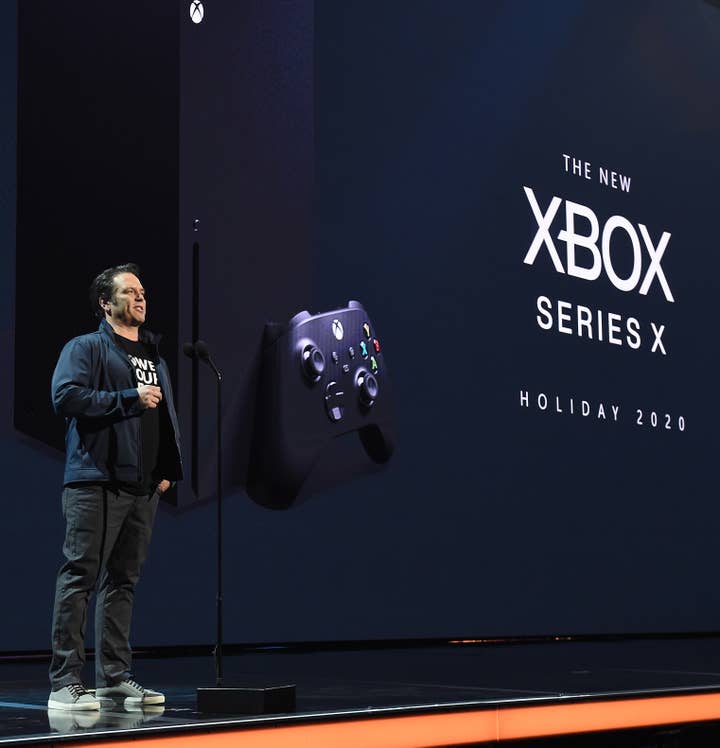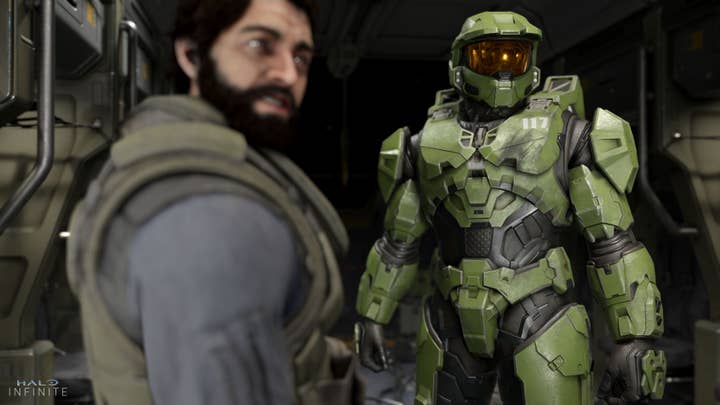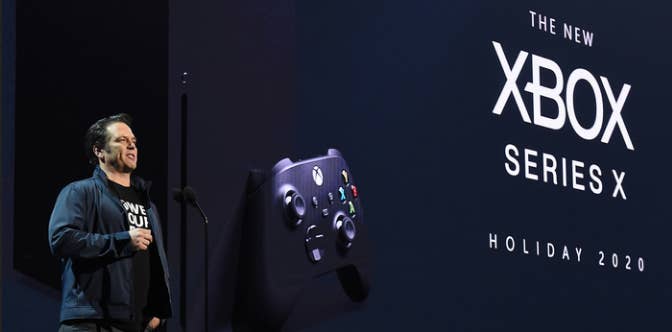Are Xbox Series X developers being held back by Xbox One?
“Held back is a meme that gets created by people who are too caught up in device competition”
This is part of a series of features with Xbox Game Studios. Check out the teams discuss life as a Microsoft-owned company here, and developing games for Game Pass here.
A new console generation year is always an exciting time, even if the fundamentals of them rarely change.
Which console has the best price? Which one is the most powerful? Which one has the best exclusives? Those are the typical deciding factors. And if you read many analysts of the upcoming showdown between Xbox Series X and PS5, the conversation has largely been the same.
This time things are a bit more interesting, though, because beneath the surface there is a significant difference in the objectives of the two big competitors. For Sony, it's similar to the past 25 years, with PlayStation boss Jim Ryan telling us last year how he wants to upgrade people from PS4 to PS5 as quickly as possible. For Xbox, the platform is less the new console, and more the Game Pass subscription service. It wants to grow its existing user base of ten million subscribers by making its exclusive games available on PC, Xbox One, Series X and its xCloud streaming service. That's why Microsoft has said that its slate of games for its next console -- for the first year at least -- will also work on the current machine.

Microsoft feels that by doing this it has the potential to attract a far bigger user base than was possible with just a new piece of hardware. Yet the lack of a genuine Series X exclusive also potentially, in the words of one fellow journalist, "hands the keys to the console market to Sony." Whatever the outcome, it's certainly not a typical console transition.
But what does this Xbox strategy mean for the games its studios are making? In another recent interview with Jim Ryan, we asked him if he would consider following a similar model to what Xbox is doing. He responded by saying that "it is time to give the PlayStation community something new, something different, that can really only be enjoyed on PS5."
Sony is tasking its studios to make games that are only possible on the more advanced machine, whereas Xbox is asking its studios to make games that can work across generations. It's a difference that's sparked online social media debates over whether the Xbox studios are being held back as a result.
"Frankly, held back is a meme that gets created by people who are too caught up in device competition," says Microsoft's executive vice president of gaming, and Xbox chief, Phil Spencer. "I just look at Windows. It's almost certain if the developer is building a Windows version of their game, then the most powerful and highest fidelity version is the PC version. You can even see that with some of our first-party console games going to PC, even from our competitors, that the richest version is the PC version. Yet the PC ecosystem is the most diverse when it comes to hardware, when you think about the CPUs and GPUs from years ago that are there.
"We should applaud load times, fidelity of scenes, frame rate and input latency. But that should not exclude people from being able to play"
Phil Spencer, Xbox
"Yes, every developer is going to find a line and say that this is the hardware that I am going to support, but the diversity of hardware choice in PC has not held back the highest fidelity PC games on the market. The highest fidelity PC games rival anything that anybody has ever seen in video games. So this idea that developers don't know how to build games, or game engines, or ecosystems, that work across a set of hardware... there's a proof point in PC that shows that's not the case.
"That said, we're shipping Xbox Series X this year. I'm playing it every day at home, and it is different to playing on an Xbox One X. We should applaud the work that is going on with the SSD, and the work that is going on with audio, to pick some of the areas that Jim [Ryan] and Mark [Cerny] and the stuff that [PlayStation] is focused on. We should applaud load times and fidelity of scenes and framerate and input latency, and all of these things that we've focused on with the next generation. But that should not exclude people from being able to play. That's our point. How do we create an ecosystem where if you want to play an Xbox game, we're going to give you a way to go play it?"
The comparison to how the PC games market operates is the way Xbox wants us to look at it, and it's recently added to its expertise in this area. Although some of its newly-acquired studios are known for their console work, like Playground Games and Ninja Theory, others such as Double Fine, Obsidian and InXile are well versed in making games for PC.

"So many of our teams are used to shipping on PC," says head of Xbox Game Studios Matt Booty. "If you look at some of the store comments you get on PC games, some of the more negative feedback is because people are trying to run the game on an old machine that is very underpowered, but they have the expectation that it should run.
"Our teams have a pretty good skillset on architecting things so that it is scalable and putting that into the hands of players. We are so tightly connected to the hardware team and the platform team, that I don't ever worry about taking advantage of the high end. I don't think we'll be in a situation where our teams won't be making the most of what is given to them. In fact, I don't even know how we'd do that [laughs]. Keeping a game team away from new hardware, new features and new things, that is where they're naturally going to gravitate.
"The work will be in making sure we put controls into the hands of the players. So if you're running this game on an Xbox One, is frame rate important to you? Is visual fidelity important to you? Let's give you those options. And I think we are going to see more of that, where we will be able to bring some of our experience of developing for PC to bear."
"I've been asked before what's the most important thing about future generations? And I'm like: RAM"
Feargus Urquhart, Obsidian
Double Fine studio head Tim Schafer adds: "Before consoles, we did PC, and you end up thinking about your game in a platform agnostic way. You think about the game and what you want it to be, and the game is smart enough to fit onto the destination. If that's current generation or next generation, it'll be a little different and you'd take advantage of both platforms, but in the end the heart of the game is the same.
"If you don't do that... you could say our games are about narrative and comedy, which works on any console. But as we've found out from the PC market, if someone invests a lot of money into their system, they want to see you using it. They want the infinite resolution and stuff like that. You need to think about that kind of stuff."
Obsidian boss Feargus Urquhart says that from the perspective of building RPGs, new hardware doesn't change the company's priorities.
"Of course technology is important to RPGs, but for us it is about characters, story, reactivity and player agency," he says. "I was playing an Apple 1.5-plus -- it wasn't really an Apple 2 because my friend's dad had cobbled it together -- and we were playing Wizardry in like 1980. And here we are 40 years later, and Obsidian is still making RPGs. So what makes an RPG is not the technology.
"Now our job is to put people into worlds, and technology does afford us to make a world more believable... I've been asked before what's the most important thing about future generations? And I'm like 'RAM', the least sexy thing out of all of it. But more RAM means more NPCs, more trees... Your streaming point is out a little farther and all these little things.
"Can we do more with technology? Absolutely. But it still always has to go back to characters, story, reactivity and agency. And that has to be irrespective of technology.
"Gaming is bigger than any one device, and that is something as an industry that we've embraced as we bring more players in"
Phil Spencer, Xbox
He continues: "I think it's super important to those who are going out and getting new consoles, that they feel good about the games that they are buying on them. When we are eventually working on those, we will look at how to balance between the different generations of hardware. But what is super important to me is that it is not a different experience. It's not a case of you get half the quests. The idea is that it has to be that same Obsidian experience no matter what platform it is on."
For InXile's Brian Fargo, the possibilities brought about by the SSD and ray-tracing are exciting. But he reminds us that, as more people upgrade to Series X and more powerful PCs, there will come a time when attention will switch from the older machines to the new ones.
"It depends where you are in the process," he tell us. "With Wasteland 3 for example, it already works on the older machines, so that's no big deal, and we are just going to take advantage of the Series X features. But as you go further out, it depends when your title is coming. 2022? 2024? The answers might change depending on that formulae. For us, it is just keeping that in mind. We have always had to think about other formats, so this is not a new calculus for us."
Yet regardless over whether developers feel able to fully take advantage of the Series X, the point for Xbox is that it's more important to be accessible. Nintendo may make game that you can only do on Switch, and Sony may build games that can only be played on PS5. But that's just not something Xbox wants to do.
"As a player you are the centre of our strategy," Spencer concludes. "Our device is not the centre of our strategy, our game is not the centre of the strategy. We want to enable you to play the games you want to play, with the friends you want to play with, on any device. On TV, the Xbox console is going to be the best way to play console games. Xbox Series X is the most powerful console out there and it will have absolutely the best versions of our console games. But that's not to exclude other people from being able to play.
"Sorry, I am a bit soapboxy with this one. Gaming is about entertainment and community and diversion and learning new stories and new perspectives, and I find it completely counter to what gaming is about to say that part of that is to lock people away from being able to experience those games. Or to force someone to buy my specific device on the day that I want them to go buy it, in order to partake in what gaming is about.
"Gaming is bigger than any one device, and that is something as an industry that we've embraced all up as we bring more and more players in. I think it's vital to the role that gaming can play on the planet."

